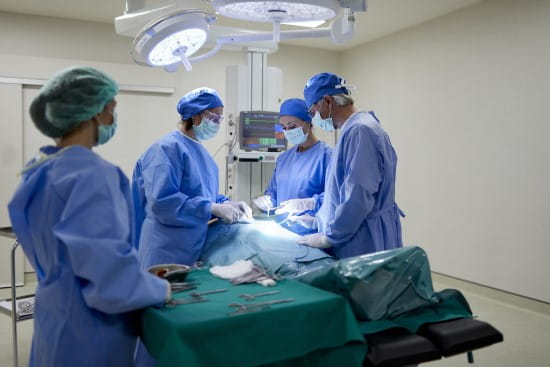
General Surgery Residency – Northeast
Provide lifesaving care for patients of all ages. Learn how with a Geisinger general surgery residency.
About us
Joseph P. Bannon, MD, FACS, FASCRS, program director
The General Surgery Northeast Residency was founded at Geisinger Wyoming Valley Medical Center (GWV) in 2009. Today, the Geisinger Northeast General Residency is based at two busy regional referral centers, GWV in Wilkes-Barre, Pa., and Geisinger Community Medical Center (GCMC) in Scranton, Pa. The facilities are about 15 miles apart.
Educating you, our future surgeons, as clinically excellent physicians is our goal. You’ll complete the program skilled in practicing high-quality, cost-effective, evidence-based surgical care and able to administer this care with a patient-centered approach.
We are accredited by the Accreditation Council of Graduate Medical Education (ACGME). The program is a five-year general surgery residency, and we accept four residents into categorical positions each year.
Since our program is based at GWV and GCMC, the majority of your surgical education takes place at those two facilities. This includes rotations in general surgery, acute care/emergency general surgery, vascular surgery, trauma surgery and critical care, surgical oncology, colon and rectal surgery, cardiothoracic surgery, bariatric and minimally invasive surgery, and endoscopy. As a resident, you’ll train at Geisinger Medical Center in Danville for rotations in transplant surgery and in pediatric surgery at Geisinger Janet Weis Children’s Hospital.
Fortune/Merative ranked Geisinger Wyoming Valley Medical Center #9 among the 25 Top Teaching Hospitals In 2022.
The Geisinger general surgery residency is integrated with Geisinger Commonwealth School of Medicine, which is based in Scranton. Residents are actively engaged in medical student education.
Geisinger Northeast’s graduate training program in general surgery strives to educate critically thinking surgeons who are lifelong learners and leaders in a constantly changing environment. As a prospective resident, you can take advantage of our health system’s unique features:
- Among the largest in Pennsylvania, with a population reach of more than 1 million residents.
- Continued growth as a network of community, long-term and tertiary care facilities.
- Among the leaders in U.S. healthcare quality initiatives. For example, Geisinger’s Quality Institute is a learning institution designed to build organizational capacity to continually improve and redesign work through education and coaching.
- Geisinger’s commitment to research has grown to include two dedicated research centers, the Siegfried and Janet Weis Center for Research, and Henry Hood Center for Health Research, as well as system-wide clinical departments and service-line faculty engaged in numerous investigative projects.
- National recognition: One important indicator of quality is whether a hospital and its staff are recognized by independent organizations devoted to measuring healthcare quality.
- Among the nation’s first institutions to fully adopt an electronic medical record system (Epic).
- Has one of the largest genomics programs in the world: MyCode, a community health initiative and precision medical project at Geisinger locations in Pennsylvania and New Jersey. Includes a system-wide biobank designed to store blood and other samples for research to be used by Geisinger and Geisinger collaborators.
Build the healthcare delivery system of tomorrow
Our home: Northeastern Pennsylvania
Northeastern Pennsylvania (NEPA) is a great place to live, with safe neighborhoods, an affordable cost of living and access to recreational activities. NEPA is close to New York City and Philadelphia, giving you access to major cities in just a few hours. Overall, our communities are ideal for living a stress-free, healthy lifestyle. More importantly, NEPA is a place where you can make a difference.
